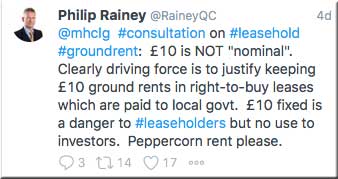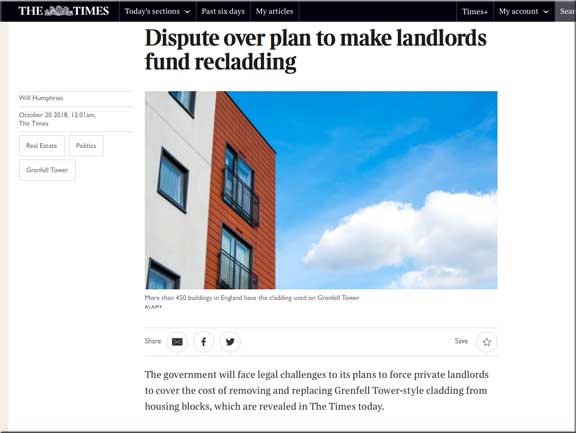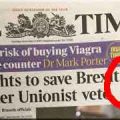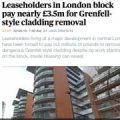By Sebastian O’Kelly
Government plans leaked in The Times to force residential freehold speculators to pay to remove Grenfell cladding from private blocks are doomed to fail.
The proposals would almost certainly face legal challenges.
They are the latest in a series of disastrous announcements, which followed Communities Secretary James Brokenshire reneging on his predecessor Sajid Javid’s promise to reduce new ground rents to as low as zero.
Where freeholders are refusing to pay for cladding removal, the government intends to force the works to be done and reclaim the money from the “building owners”: that is, the freeholders.
A spokesman for Communities Secretary James Brokenshire told the Times (although these quotes were not published):
“We’ll pay local authorities to step in and do the remediation. They’ll recoup the money from building owners by placing a charge on the building (or similar).
“We’ll do this first for buildings with partial cladding. Then we’ll expand to other buildings with more extensive cladding – although we’d expect the first step to have an impact and reduce the number of buildings requiring this action.
“Councils would use existing enforcement powers to intervene with a building carrying serious safety concerns and recoup costs. This would be a new way to use that enforcement power, and as such there is the potential for a legal challenge, but James Brokenshire is prepared to fight for residents in the courts if needs be.
“Leaseholds and freeholds are contracts, but in many cases these are highly complex and don’t make it easy to attribute liability. Those contracts’ legal constraints add more complexity which makes it hard to enforce remediation.
“That’s why we’re stepping up and working with councils to fund the use of their enforcement powers.”
LKP cannot see any more reason why the freeholders should pay up than the leaseholders: this is a dispute between developers and government, which creates the regulations.
Here is a pod cast by Inside Housing with Martin Boyd and Jim Fitzpatrick MP, saying 20,000 homes affected by Grenfell cladding issue:
https://soundcloud.com/insidehousing/the-leaseholders-stuck-in-buildings-with-grenfell-style-cladding
The freehold owners would have to challenge this idea, or the future value of the income stream in these freeholds would be fatally undermined.
In addition, it would set a precedent for further cash calls for building flaws – fire doors, compartmentalisation, asbestos etc – that emerge in the future, and trash the value of freeholds.
That would be calamitous for leaseholders as the proposal destroys any incentive to enfranchise and be responsible for the building in which they have the majority financial share (as well as being a disaster for those who already own their freeholds).
Martin Boyd, LKP trustee chair, said:
“In almost all circumstances, the cladding replacement costs will be more than what the freehold or headlease asset actually worth.
“By way of an example: the leaseholders at Charter Quay, in Kingston, acquired the headlease for our site for £900,000 in 2013, and then added the freehold for a further £1 (one pound) in 2017.
“The site itself has a rebuild valuation of about £150 million. If it had cladding, which fortunately it doesn’t, it might cost at least £4 million to replace it, given the size of the site.
“So, that’s four million times more than the value of our freehold (the “building ownership”) and at least four and a half times the value of the headlease.”
The government’s idea would also mean that Slough Council would have to take enforcement action against itself, as it bizarrely purchased the freehold of Nova House off freeholder Robert Steinhouse for £1 in an unexplained deal.
It is, at present, apparently seeking payment from the leaseholders.
Ground rent speculators Pemberstone seek £3m tribunal ruling over Grenfell cladding
The proposals were aired in the Times exclusively, presumably in order to test the water, and backtrack if necessary.
The government approach seems to be to threaten freeholders – who it sees as “building owners”, when they are simply the owners of a building’s legally enforceable income streams – from further participation in existing government housing schemes, especially the Home Building Fund and Help To Buy.
Neither involves freehold owners, who won’t be bothered.
It may work with developers, and perhaps has already done so. Barratt, Taylor Wimpey, Mace and Bellway have undertaken to remove cladding, with Lendlease and Ballymore saying they won’t be paying up.
There might be another possibility: is the government exploring some sort of deal to water down the leasehold reform agenda to get the freehold speculators to pay for cladding removal?

Last week, Mr Brokenshire reversed on setting new ground rents to zero, and proffered notional £10 ground rents instead. This move was a marked backward step on his predecessor Sajid Javid’s promise to set new ground rents as low as zero.
It is also fatal to the advancement of commonhold tenure, which exists for apartments in virtually every jurisdiction in the world apart from England and Wales.
In endorsing ground rents, Mr Brokenshire is approving speculative investments in ordinary families’ homes that are for no defined service whatsoever.
Ministers have repeatedly exhorted developers and freeholders to “do the decent thing” to remove cladding from private sites.
To date the only freehold owner that has undertaken to pay to remove Grenfell cladding is Legal and General, which has committed to pay out £12 million for the Blenheim Centre / Resolution apartment block in Hounslow. We wholeheartedly applaud this, coming from a company with a genuine sense of corporate social responsibility.
L&G is hardly on the same level as private equity speculators – such as the Adriatic Land variations – hiding their beneficial ownership of a slice of people’s homes behind nominee directors in companies often offshore. (It is, perhaps, a bit churlish to point out that L&G was in for a big bill in any case as it owns the shopping centre on which the flats stand.)
The property tribunal has considered three cladding cases and ruled that the leaseholders should pay to remove it, not the freeholders.
Ground rent speculators Pemberstone seek £3m tribunal ruling over Grenfell cladding
Fresh building is to pay £100,000 for fire marshals … with more Grenfell bills to come
The Leasehold Knowledge Partnership does not habitually speak up for Vincent Tchenguiz, but why should he be asked to pay to remove the cladding at Citiscape in Croydon?
He owns the ground rent income and the freehold of the building, but the management contract was sold off to the management group FirstPort and the income from the site is small.
Why should he pay anything at all? Especially as the tribunal has said he needn’t do so?
Were he to do so, why should he not pay for other flaws in the building in the future?
The government’s approach to this is a flawed understanding of what a freehold owner is: he is a speculator in the income streams of a building.
He is absolutely not its professional long-term steward. Indeed, the physical state of the building has no relevance to the legally enforceable income he can receive from it.
That is why freehold speculation in people’s homes should end.
Mr Brokenshire could pay regard to how Taylor Wimpey intervened at Glasgow Harbour, which also has Grenfell cladding.
Here, there is no speculative freeholder as leasehold does not exist in Scotland. So the dispute was between the flat owners and the builder – with no intermediary – and Taylor Wimpey, to its credit, has paid up.
In contrast to the Westminster government, which seems not to understand even the basics of leasehold tenure in this country, the Australian government has responded intelligently to the Grenfell cladding disaster.
It has 100 buildings with cladding, and is issuing low interest loans to replace the material.
Of course, in Australia the social responsibility aspect of the loans is unquestioned, because the money goes to the flat owners, who own the building through commonhold strata title.
In merrie old England, where the idiocy (and worse) of leasehold landlordism holds sway, lending money to a murky offshore private equity outfit, would be more difficult to justify to the public:
Reaction to Grenfell and Combustible Cladding – a note from Australia
Problems associated with external wall cladding products became apparent in Australia in 2014 when a fire escalated quickly up the external façade of the Lacrosse tower in Docklands, Victoria.
https://soundcloud.com/insidehousing/the-leaseholders-stuck-in-buildings-with-grenfell-style-cladding






 LKP predicts the future
LKP predicts the future






















The manufacturers of the cladding have produced a material not fit for purpose and surely it should be an obligation on the freeholder in the first instance to pursue a claim against he manufacture. The manufacture would probably hold liability insurance and the claim may be covered under that policy
If there is no cover then it would appear based on FTT decisions that the lessee may have to cover the cost and perhaps the government should offer low interest/ zero Interest loans to assist . Expecting the freeholder to step outside the legal frame work and out of decency pay for the cladding is naive in the extreme and shows how hopeless the lessees plight is
Stephen – Caveat Emptor – the freeholder
Invariable thearge freehold owners will be well represented and know that under the terms of the lease they are not liable for the cost of cladding . The lessee operating on more modest means often uses cheap solicitor and gets poor advice
There’s may be merit in introducing legislation making the freeholder explore all possiblilities including investigating any potential claims from product liability insurers prior to replacing the cladding
Interesting to hear some constructive input on this point
…and providing the freeholder has insurance or warranty =then bully for him.The days of fleecing gullible and vulnerable leaseholders are over.
and whilst on the subj, the suggestion of a “nominal” £10 GR will only serve to enable the unscrupulous to continue in their money grubbing pursuit of ill-gotten “fees”
I find it of great interest to note that tribunals rule on the strict terms of the lease when it comes to deciding who has to pay for the cost of replacement cladding? This is why leaseholders have lost every case at the tribunal.
And yet we know some developers/freeholders have as a “goodwill” gesture agreed to pay for replacement cladding out of their own profits..
This avoids a court case
Avoiding a court case. does avoid answering questions such as:
On what date was the development built?
On what date was it known that safety problems had been identified with cladding?
Does the specifications of the fitted cladding accord with the specifications given to the planning authority?
Who signed off the fitted cladding as safe?
So if problems with cladding were identified in a fatal fire in 1999, problems with cladding were spoken of in Parliament in 2000 and Scottish law changed in 2003 then it could be argued in court that developers/planning authorities should have known about the dangers of cladding for any developments built after 2000?
Grenfell highlighted that a less expensive cladding was used than was originally specified .
An inspection of cladding to show if it exactly matches the original specification may prove fruitful?
A case of flawed building fire regulations versus flawed tenure laws.
All roads point to Westminster on both issues. There has been a deregulatory attitude toward building fire safety by successive governments since the 1980`s, finally conspiring to how tower blocks could be legally constructed with dangerous flammable cladding. Nobody can claim there were not enough warnings though. The Conseratives are responsible for killing more in the Grenfell Tower fire than all the terrorist deaths in the UK since the 90’s, because theyve had 8 years to do something about it.
Did developers and archtitects somehow misinterpret the regulations? That`s highly improbable, being propfessionals and if so wouldnt local planning authorities have highlighted these breaches during construction? In instances where developers and architects have gotten around lax regulations and are found to be at fault, then they should foot the cost. It may be proven (although the disasterous back to front analysis of Public Enquiry is delaying the truth) that the Grenfell cladding was not to original architectual specifications and was substituted for flammable cladding, though this is not the case where other cladding exists and has to be removed. Each instance would have to be examined on a case by case basis and surely the developer/architect would suggest they are following government regulations that allow such practices? The lack of criminal proceedings UK is saying something.
Who is paying for the removal of cladding on 159 social housing blocks? £400m of tax payers money thats who!
So clearly, the guidance came from government and it`s right to point out that the freeholders and leaseholders do not feel obliged to fix the situation caused by sloppy, dangerous regulations. But Freeholders, claim they have little financial interest in the building but the income from lease extensions, ground rents, enfranchisement, sublet fees, permission fees, exit fees in perpetuity – the income streams, are very profitable. Some older London buildings have been under this arrangement for hundreds of years, so you cannot say there is limited financial interest. A complete paradox is allowing them to have complete control over the management of the building, its ownership and income streams but then renege the responsibility of owning a dangerous building. They have a responsibility to make it safe, not the leaseholder. The leaseholders have a financial interest in the building maintenance and upkeep, not the building construction faults or the refurbishments, which are driven by the freeholder. They own the right to use the building for a set period. That`s not ownership. This is the fault of flawed leasehold laws that put the responsibility of these repairs on the leaseholder. The government should act and remedy this.
The Australian solution is pretty significant proof in that the low income loans will put the costs of remedial work onto the commonhold owners. i.e. the people who own the building albeit shared ownership. In the England the owners are the freeholders, not the leaseholders. They owners should pay, regardless of the bad deal they have been lumbered with, tough luck.
The government relies upon the national housebuilders to provide the housing stock, as for years no public money has been allowed for local authority house building. Purchasing the land has become extremely expensive, especially in London, where estimated costs can average £300k per housing unit. You can see why the housebuilders find leasehold another income stream on the development and the government were quite happy to allow this. Anyone smart enough to realise this upward trend would put their money into freeholds with its low risk, guaranteed income stream.
For the future there is one solution and a blueprint already drawn up – Scotland in 2004. Abolish leasehold.